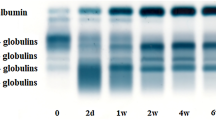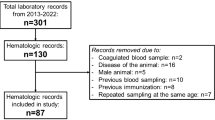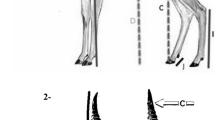Abstract
FOWL serum contains a protein which has a lower mobility than γ-globulin in agar-gel electrophoresis at pH, 8.6 and was therefore designated δ-globulin1. This component of serum is exceptional in that it has a molecular weight of only about 20,000 and that prolyl constitutes approximately 12 per cent of its amino-acid residues (Richards, to be published). A method for isolating δ-globulin has been described1, but it is complicated by the fact that only small amounts of this component are present in adult fowl sera. For this reason, and in view of its unusual characteristics, its occurrence in young birds and in other avian species was investigated.
This is a preview of subscription content, access via your institution
Access options
Subscribe to this journal
Receive 51 print issues and online access
$199.00 per year
only $3.90 per issue
Buy this article
- Purchase on Springer Link
- Instant access to full article PDF
Prices may be subject to local taxes which are calculated during checkout
Similar content being viewed by others
References
Richards, C. B., and Marrack, J. R., in Protides of the Biological Fluids, Proc. Eleventh Colloq., Bruges, 1963, edit. by H. Peeters (Elsevier, Amsterdam, 1964).
Long, P. L., and Pierce, A. E., Nature, 200, 426 (1963).
Author information
Authors and Affiliations
Rights and permissions
About this article
Cite this article
RICHARDS, C., ORLANS, E. Serum Delta-Globulin in the Young Fowl (0–29 Days) and in Other Avian Species. Nature 205, 92–93 (1965). https://doi.org/10.1038/205092a0
Published:
Issue Date:
DOI: https://doi.org/10.1038/205092a0
Comments
By submitting a comment you agree to abide by our Terms and Community Guidelines. If you find something abusive or that does not comply with our terms or guidelines please flag it as inappropriate.



